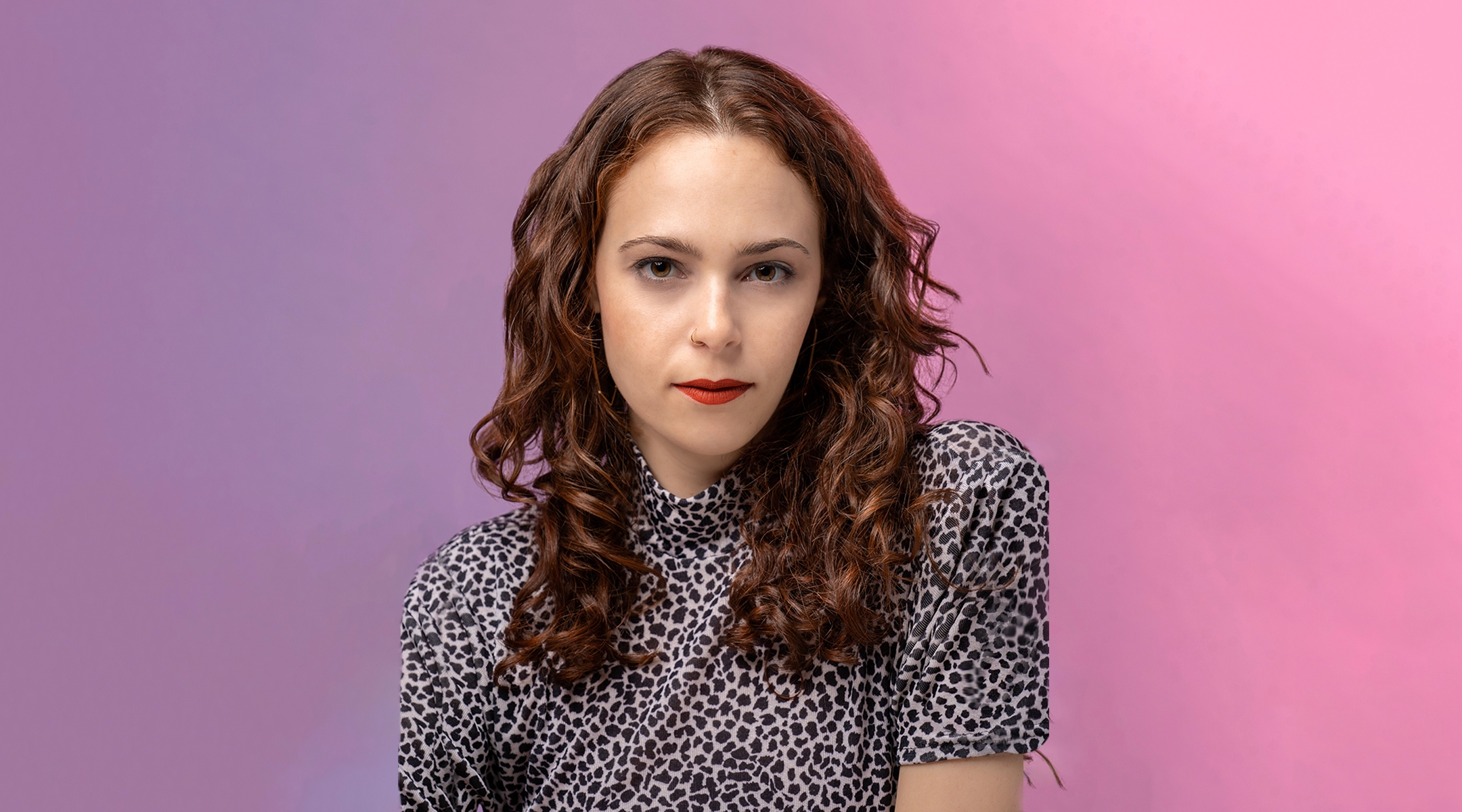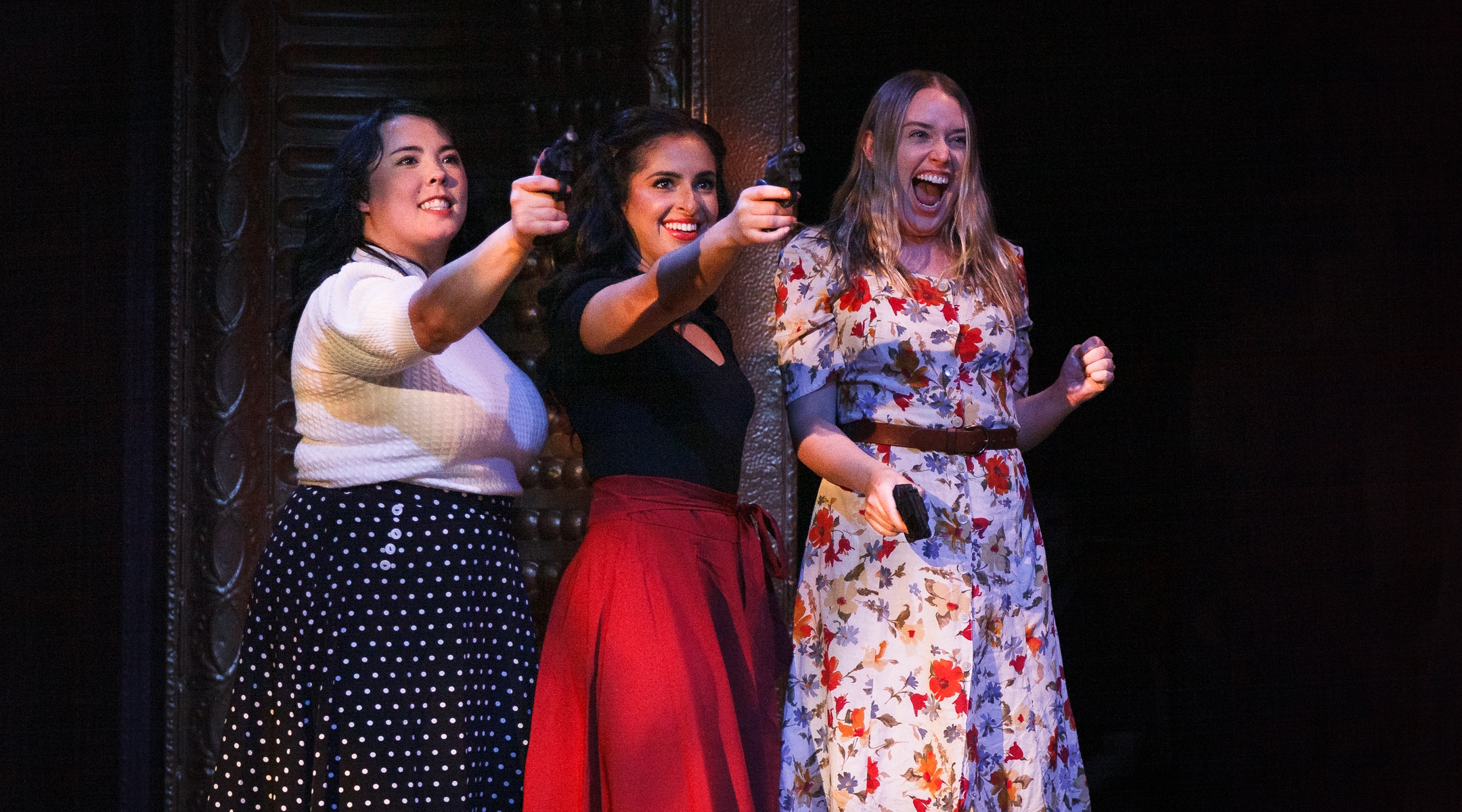(New York Jewish Week) — During World War II, three young women formed a small legion of the Dutch underground resistance, fighting Nazis with the most powerful weapons at their disposal: their youth, their gender and their sexuality.
They were sisters Freddie and Truus Oversteegen and Hannie Schaft, who, in 1940 were 14, 16 and 20, respectively. While they, along with other resistance fighters, used dynamite to destroy bridges and railroads, and helped hide Jewish children and smuggled Jews out of the country, the very young women also would go to bars and pick up Nazi soldiers. They would ask the men to go for a walk in the forest under the pretense of romance or sex — and then shoot and kill them. Their story was told in a 2019 book, “Seducing and Killing Nazis,” by the Dutch author and activist Sophie Poldermans.
Now, a new play based on their actions, “The Moss Maidens,” is one of eight plays selected from 300 submissions showing at the SheNYC Festival at the Connelly Theater (220 East 4th St.) this week.
“In my communities, both young women and Jewish people, I feel like there’s a lot of rage right now,” New York-based playwright S. Dylan Zwickel, 30, told the New York Jewish Week. “I think it will be both exciting and cathartic for people to get to see these girls raging and behaving badly and fighting systems that don’t work for them, and don’t work for people they care about, on stage.”
“The Moss Maidens” has already sold out three performances at the annual festival, which features plays written and created by people of “marginalized genders,” including ciswomen, trans and non-binary people. SheNYC chooses its submissions based on representation and how well its themes grapple with current events, Eh-den Perlove, one of the festival’s organizers said.
Due to the demand for “The Moss Maidens,” a fourth performance has been added, a first in the festival’s eight-year history. “Part of the reason ‘The Moss Maidens’ has resonated so much is that we’re having renewed discussions around white supremacy,” Perlove said. “It’s always been there, but it’s so relevant to how we’re kind of reacting in our day-to-day, to white supremacy, to Nazism, to neo-Nazism. It helps us ask ourselves, as a group who are maybe being persecuted or who see persecution, ‘What can you do to kind of stand up against that?’”
Ahead of the play’s opening on Wednesday, the New York Jewish Week caught up with Zwickel to discuss her inspiration for the show and why she felt the story was so relevant and necessary to tell.
This interview has been lightly edited for length and clarity.

S. Dylan Zwickel is the Jewish playwright of “The Moss Maidens.” (Yekaterina Gyadu, design by Grace Yagel)
What was the inspiration for this play?
The play is based on a true story of the young Dutch women that did this, which was my initial impetus for writing the show. In addition to doing all of this active resistance work by actually murdering Nazis, one of them was hiding Jews in her home. I first read about it a few years ago in a random article — I don’t even remember where — and as soon as I read it, I was like, “I have to tell this story.” Then I read a great book about these girls: “Seducing and Killing Nazis,” which is written from several firsthand accounts of what happened. The author had access to a lot of people who knew them, and even some of the women themselves — two that lived to be 92 and died in 2016 and 2018, which is really remarkable.
I ultimately decided not to make my story exactly that of the true story and just made my play inspired by that story. That book provided great research so I could come up with my own characters and plot based on their experience; it was really exciting having the creative license of making them my own characters, and being able to sort of dive into aspects of it that may not have been included in the original story. But there’s always that layer there that people really did make this choice. People really did do these things.
Why is it important to tell this story in 2023?
There is a certain catharsis getting to watch these young girls fight back against the people who feel that way [about Jews]. For me, amidst the rising tides of antisemitism that are happening right now, it feels very easy to react by wanting to remember how badly things have gone in the past. I do think that is extremely important, but it’s also important to think about how that instinct can be fought. The story that, as a Jewish person, you’re expected to tell about World War II, is details of the Holocaust and people suffering. It’s so important to remember all of that, but I also needed the catharsis of people fighting back. I would rather write about and live in this world of people killing Nazis rather than my people being killed. That’s what I wanted to focus on.
The story is still so relevant. A couple of weeks ago, I was on my way to see “Camelot” at Lincoln Center and there was this guy shouting antisemitic conspiracies and he had posters with antisemitic cartoons. I went into rehearsal the next day, and there’s a line in the play where a Nazi is talking about the Final Solution. I got so nauseous that I had to leave the room — having just seen this guy on the street the day before, I became so aware that there are still people who feel this way and it’s so much closer than we think.
One of the books that I read for research, “The Diary Keepers” by Nina Siegal, uses testimony from the thousands of diary entries written in the Netherlands during World War II. Siegal combed through them, translated them and published a book using these diaries. She included perspectives of Jews, perspectives of resistance fighters, perspectives of citizens who were not involved at all and just kept our heads down — which was most people — and also perspectives of Nazis and Nazi collaborators. It was really interesting reading that, especially reading about the beginning of the war and just feeling how close we are to how it did start. It was alarming, but also enlightening.
Why is it important to give these young Dutch women a voice?
Pretty much all of my writing features young women. That is an area of focus for me. I think of everything that I write as “a superhero origin story.” It’s all about girls stepping into their power. That’s true across everything I write, but this is kind of the best and biggest example of it, which is one of the reasons I’ve so enjoyed working on it — it just feels like the most major, distilled and exciting version of that.
It is just so remarkable that during that time there were these girls who, despite everything they were being told by society, had the awareness to make a different choice. There’s a lot of discussion in the play about the choice to be doing this and how easy it would have been to make a different choice. I hope that this play can help inspire young women to ask themselves, “Could I be one of these girls? Is this how I would respond in a situation like this?”
As you were writing and researching the play, was there anything unexpected that you learned about yourself or about the story?
Well, it was interesting because I initially wasn’t thinking of the play as that Jewish because the characters are not Jewish — one is half-Jewish. I didn’t want to make any of them Jewish “just because,” for two reasons. One, historically, they would have had to either be in hiding or have escaped already, so they wouldn’t have been able to be doing the activities they were doing. The other reason is I was really interested in the idea of these girls fighting to protect not themselves but other people. For the most part, the girls say they don’t even know any Jews, so they’re really not fighting for any friends of theirs, just for belief in the rights and humanity of all people.
The more we’ve worked on it, the more I’ve realized how Jewish the sense of morality and the cultural values in the play are. Even though these are not written as Jewish girls, they bear a lot of resemblance to Jewish girls and women that I know. I’ve written them as loud and brave and bold and opinionated — all of these things that I associate as being Jewish cultural values. So I think even though I didn’t write them as Jewish characters, I was surprised to discover how much of my own Jewish culture embedded itself in there anyway.
“The Moss Maidens” will be performed at the Connelly Theater (220 East 4th St.) four times this week. A digital version of the show will be available for purchase for $5 and will be available to stream from August 4-6. Find tickets and information about the SheNYC Festival here.
The New York Jewish Week brings you the stories behind the headlines, keeping you connected to Jewish life in New York. Help sustain the reporting you trust by donating today.





